Glimpses of Healing and Hope
Glimpses of Healing and Hope

Here is a sad, but necessary, update from us on our planned service trip to DR Congo this summer. We continue to pray for our fellow brothers and sisters in Kinshasa as we share in Nancy's grief. She has done so much tremendous good and work in DR Congo, and we are so grateful and honored to call her part of our KRMC family.
+++
by Nancy Myers
Everybody has lost something in this pandemic.
If we weigh our losses against others’, some of us could easily discount our individual losses, especially if we have been taught to count our blessings. I am alive, I am well, I have enough to eat, I have friends and family and the means to communicate with them, and I am financially secure. And it is spring. So why am I feeling sad today?
The universal experience of loss gives us an unprecedented opportunity to explore the nature of loss and mourn together. Okay, let’s have a cry now. Or a scream. Or a community howl. Or a banging of pots on porches. For everything we have lost.
Name your losses. I dare you. Think of at least one thing that you will probably never get back, even when this is over.
For me it is a kind of job I have grown over the last ten years that has felt in many ways like the culmination of what I have to offer to the world: I have been a self-appointed goodwill ambassador and liaison between Mennonites in the USA and the Democratic Republic of Congo.
I have been a bridge-builder between cultures. An encourager. A catalyst of good works. An interpreter. A channel of love. I have built personal relationships and grown a web of relationships in two contrasting cultures that share membership in the body of Christ.
I have demonstrated, for myself and for others, the electrifying power of face-to-face contact, on-the ground presence, of the sort that can only be developed when we directly participate in each other’s lives—when we wander in each other’s cities, eat in each other’s homes, worship together, talk and plan together.
That is the key. My involvement in Congo has required travel. Since I started on this connectivity venture (it dates from 2010) I have made 7 or 8 trips to Congo (I’m losing count). I have sometimes gone alone, but often I take someone with me and spread the connections and goodwill that way. I quickly relearned how to get around in Congo, my French was still serviceable (after our 3-year stint in then-Zaire in the 1970s), and I am a pretty good travel leader.
We have often entertained Congolese visitors—established friends and new ones—in our home as well, but travel this direction has been severely limited in the past five years. So the best way to build connections continues to be by taking fellow American Mennonites and family members to Congo.
The trip that I was planning this year was a culmination of that effort: I was going to shepherd a delegation of half a dozen people from my congregation to our sister church and its community in Kinshasa. The focus was to be sharing worship music and working together on a school building. The trip was scheduled for July. When the word “pandemic” began to be spoken in February, however, I cancelled the trip. I did not want to be responsible for taking people on a long-distance plane trip, to a country with shaky medical services, during a global pandemic.
It turns out that the virus is, so far, more prevalent here than there but, in my opinion, long-distance air travel should be out of the picture anyhow until there is a vaccine for Covid-19 and it is widely available.
That could take a couple of years. By then, this whole trip would have to be replanned and that would require energy that I can’t now imagine generating. I will be in my late 70s. The Congo literacy project that I helped start doesn’t really need me anymore, either, so my main reasons for traveling to Congo are rapidly disappearing.
Thus I am seeing this “job” I have created, that I have loved into being and that has been a primary focus of my retirement years, coming to an end. I am mourning its loss.
What losses are you mourning these days, when you let yourself be sad?
NOTE: This originally appeared on Nancy's blog The Practical Mystic.
Add a commentby Beth Gerig
It’s been so nice to see and hear from so many in the congregation through Zoom on Sunday mornings. I am missing getting together with friends and family. As Easter weekend approaches it’s been a real temptation to find ways to “work” around the social distancing. Maybe if my family went to Robbin’s Lake and ate outside in the open air, we could be acting responsibly, right?
Kevin and I stood outside of our son Nate's house last Saturday and visited with his wife Brie and our grandkids while they stood on the front porch. Alinna, Brie's niece who we consider to be our granddaughter, was concerned that Grandma and Grandpa might be missing her too much. Their neighborhood association encouraged everyone to put teddy bears in the windows so that families taking walks could count them. Surprisingly, even the older children were engaged in the activity as they walked by!
On a more sobering note, telechaplaincy is something to get used to. The extreme vulnerability of high risk individuals hits home for me. One of the PTs on the high-risk COVID-19 unit was not intubated and, therefore, able to actually speak with me via phone even though they struggled to breathe. Their first emotionally-laden, breathy words as they choked up were, "I'm still alive --I'm still alive."
These are dramatic stories to hear but what about your experience in this time? I suspect that those who read this will either consciously or unconsciously use some form of the ages-old thinking pattern of using someone else’s tragic circumstances to put one’s own life “into perspective.” Some of this thinking finds merit in helping us to be grateful. I hear this all of the time and let me tell you, there are faulty internal responses to this thought pattern. “Someone’s got it worse than me” is often code for “I am making sure I am not pitying myself, and I am making sure that the person hearing it won’t think poorly of me.” Even more concerning is that the cavalier attitudes people adopt regarding their own experiences may skim over or even press down their senses of loss, grief, or fear. That’s avoiding pain -- not dealing with it! Sadly, spiritual and emotional growth or true resilience does not occur when this happens.
All of us are experiencing disorienting things to a greater or lesser degree. They have meaning, and they are significant even if they do not involve imminent personal threat to us and ours.
Richard Rohr's Daily Meditation for March 30 finds resonance in my personal and vocational understandings of the chaotic nature of upheaval, loss, and grief when the disruption of "Order" (which we somehow decided is God's understanding of goodness that is achieved by following rules and doing the right things) occurs. Rohr writes,
"All great spirituality is about what we do with our pain. Creation has a pattern of wisdom; and we dare not shield ourselves from it, or we literally will lose our soul. We can obey commandments, believe doctrines, and attend church services all our lives and still daily lose our souls if we run from the necessary cycle of loss and renewal. Death and resurrection are lived out at every level of the cosmos, but only one species thinks it can avoid it—the human species.
I am afraid that many of us with privilege have been able to become very naïve about pain and suffering in the United States and the Western world. We simply don’t have time for it. However, by trying to handle all suffering through willpower, denial, medication, or even therapy, we have forgotten something that should be obvious: we do not handle suffering; suffering handles us— in deep and mysterious ways that become the very matrix of life and especially new life. Only suffering and certain kinds of awe lead us into genuinely new experiences. All the rest is merely the confirmation of old experience."
In her book Listening for the Soul: Pastoral Care and Spiritual Direction, Jean Stairs invites Christians to understand the ways the cycle of loss and renewal in our everyday experiences and, in our states of upheaval, can be seen through the (Easter) lens of death and resurrection.
I wonder what goes through your minds at this time, and what emotions rise to the surface? Be with those thoughts and feelings. Examine them, hold them, and share them if you wish with a trusted person/group. Wallowing in them is not what I am encouraging here! Find a gracious understanding of your concerns not a dismissive one! Honesty with feelings is an act of bravery and a road to spiritual well-being and resilience.
On a brighter note, I have taken a picture of the seedlings growing in my basement. We saw the snowy egret that comes to our pond once or twice a year on its way to wherever it goes. The cardinal is back that tries every year to go through my dining room window. Spring is a time we are reminded of hope, resurrection, and RESILIENCE!
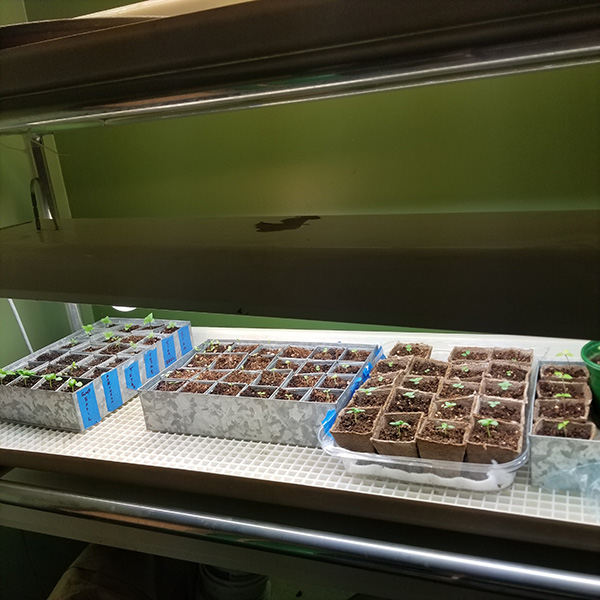
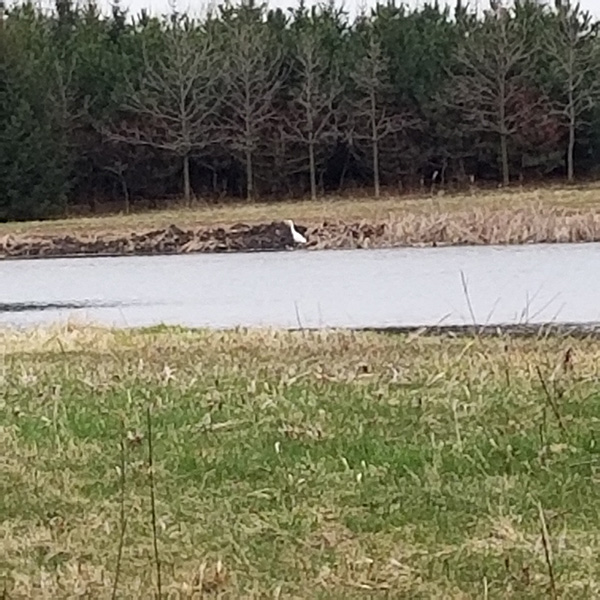
Totally off topic here, but if you are able, watch the Netflix docuseries Chef's Table. It's definitely not just for foodies. The stories are hopeful, poignant, masterfully presented, and touch on themes of social justice, immigration, and earth care. This documentary would make great Zoom conversation if you are lucky enough to enjoy dinner table conversation at this time.
To my community of faith, I wish you resurrection and resilience.
Add a comment
by Danile Martens
We had a musical meditation Sunday morning by a sister-brother acoustic threesome. The music was quite nice and was a bit of a landmark experience for me because I could hear decently, though not all the lyrics, and I heard the high notes as not in tune or not audible. The surgery I had two years ago to remove an acoustic neuroma and that resulted in significant loss of hearing left me with quite a lot of phantom noise in the operated ear that causes audio distortion, a roaring that was at first quite unpleasant and exhausting. The first time I heard congregational singing and our very excellent pianist play, I was appalled. Hearing the trio this Sunday was a marker of sorts of how far I had come. My hearing has not changed; rather, my brain has been busily working to make sense of what I hear and to filter what is not useful, and getting better and better at it with no intentional help from me other than to keep exposing it to sounds that I can’t understand. And it has learned how to help me hear precisely through exposure to what is unpleasant and confusing. My tendency at first was to back away from external sounds, away from communication; but through the din and uncertainty a thread of meaning has slowly emerged.

My life flows on in endless song above earths lamentation. I catch that sweet though far off hymn.
The response song Sunday to the musical meditation overwhelmed me. It is such a familiar song, and yet I apparently had not sung nor listened to the words in two years:
Through all the tumult and the strife I hear that music ringing. It finds an echo in my soul.
The underlying noise could not obscure the music I heard that Sunday. The good work of my brain met my memory of song, and of music generally, and restored a semblance of what I used to hear.
No storm can shake my inmost calm while to that Rock I’m clinging.
There was another side to this significant loss: at my lowest point, immediately after surgery (and I suppose mediated by the drugs involved), I was graced with a palpable and profound awareness of a loving presence with me in my drugged misery. It was not a presence that lifted me out and away from that misery, but which occupied the same space; the set of misery (to use a math metaphor) completely enclosed by the set of Love.
What though my joys and comforts die? What though the darkness gather ‘round?
In the following two years, as an almost mystical experience of love has given way to the realities of life which must also be lived on a mundane level, I am learning what I can do to inhabit that other consciousness, even as I recall it was/is a gift: the veil of normalcy is parted briefly at times, but it also necessarily closes. Our part is to be alert, to watch for it.
The peace of Christ makes fresh my heart, a fountain ever springing.
Take joy where you find it, as Mary Oliver advises in one of her prose poems. Yield fully to beauty and to love when they come to turn your carefully guarded soul inside out for a time. And in between times, when you come down from the heights of experience and feeling to live your love in more mundane or difficult ways, remember well what has been, and hope to welcome it again at the appointed time in new guise.
Since Love is Lord of heaven and earth, how can I keep from singing?
This article originally appeared on https://restorationfarm15.wordpress.com/blog/.
Add a commentby Associate Pastor Jen Shenk

Be still and know that I am God. (Psalm 46:10)
Some of you may have heard me share reflections this past Sunday about our family’s trip to Michigan’s Headlands International Night Sky Park, and how that experience of contemplation was personally powerful. I’m so grateful that many of you have shared varying responses with me. Some have expressed enthusiasm for trying contemplation. Others have asked “how do I do this?” and, in addition, some have shared concerns of “what if my contemplation turns into inaction?”
I get Richard Rohr’s daily emails, and his latest ones have been on this exact topic of inner silence. I share some of his thoughts with you in his own words, as he says it so much better than I can:
Silence has a life of its own. Silence is not just an absence, but a primal presence. Silence surrounds every I know with a humble and patient I don’t know.
The soul does not use words. It surrounds words with space, and that is what I mean by silence. Silence is a kind of wholeness. It can absorb contraries, paradoxes, and contradictions. Maybe that is why we do not like silence. There is nothing to argue about in true inner silence, and the mind likes to argue. It gives us something to do. Yet true interior silence does not allow you to take sides. That is one reason contemplation is so liberating and calming. There are no sides to take and only a wholeness to rest in—which frees us to act on behalf of love.
To be clear, the kind of silence I’m describing does not ignore injustice. The opposite of contemplation is not action, it is reaction. We must wait for pure action, which proceeds from deep silence.
Silence can be a great teacher, if we allow it. In the space and the quiet, we can remember who we are, and who God is. We can connect to our deepest self and to one another in a way that goes beyond words and leads to a deep, centered knowing.
May you find ways during this season of Epiphany to create regular times of silence, stillness, and times of “doing nothing” so that you can remember who you are-- BELOVED. Hang out with God, and see how God’s light already shines in you (and in everybody else!). Once this becomes a starting point, then it is out of this space of centeredness that our light can shine as we serve one another.
Be still.
And then... SHINE!
Add a comment
In this month's Kernels newsletter, we mention Pastor Brian Zahnd.
Pastor Zahnd is is the founder and lead pastor of Word of Life Church located in St. Joseph, Missouri. He has written several books including Sinners in the Hands of a Loving God and Unconditional?: The Call of Jesus to Radical Forgiveness. You can read more of his writings on his blog or listen to his sermon podcast on his website.
We especially like his Advent category which you can access here.
Add a commentAfter almost a year of work, the shower project has been completed, and two LOGMichiana weekends have been successfully held here in our facility. Praise be to God!
We couldn't have done it without the financial contributions of both the LOG community and our congregation as well as the labor that went into converting this old kitchen-turned-storage-room into a fully functional shower room complete with new flooring, new lighting, and new plumbing as well as the finishing touches like shower curtains, liners, mats, soap, and even little rubber duckies. Like so many things in life, we were able to transform something little-used and sometimes-forgotten into something functional and beautiful with some determination and a lot of hard work.


We are so excited and grateful for the opportunity to better serve our community by offering space and showers for those interested in hosting weekend-long events and retreats here. It's always been our hope to provide the Michiana community with the chance to use our facilities for their meetings and events -- and with these showers in place, we are now even more capable of doing so.
Add a comment
by Nancy Myers
Before you tie up your summer plans for 2020, think about signing up for the trip of a lifetime to the Democratic Republic of Congo, as part of KRMC’s “Bondeko Bonding” delegation.
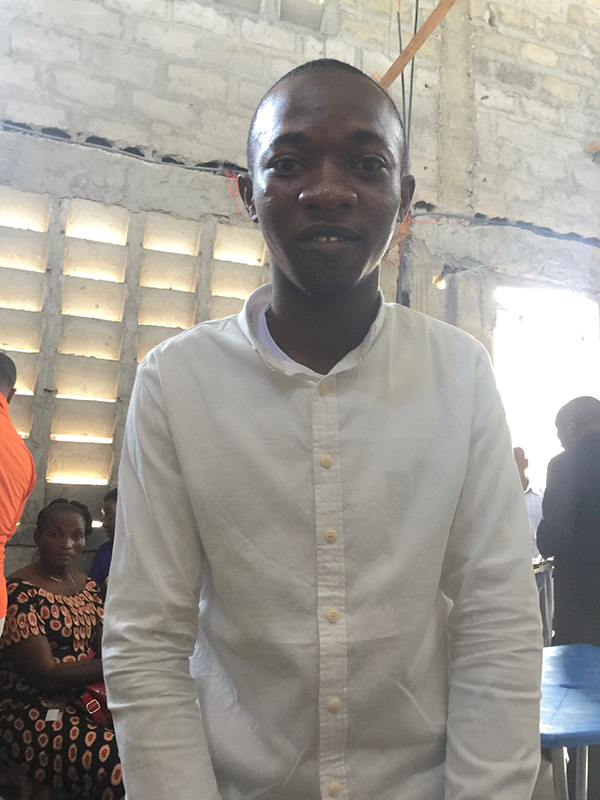
Francis Kabanza, secretary of Bondeko’s youth group, would like to meet you. He is a recent university graduate in geology and speaks English.
When: July or August 2020
What: 10 days of work, worship, and cultural immersion with members of our sister congregation, Bondeko Mennonite Church, Kinshasa
Who: 4–8 hardy souls from KRMC, including (we hope) one pastor, one videographer, and one tour leader
This will be no ordinary tourism, though you will see some exotic sights. There are hints of a boat trip up the Congo River. And people-watching in Kinshasa is as good as anywhere on the planet.
This will be no ordinary service trip, though you may be called upon to do some good, hard physical labor. Bondeko’s school-building project is on hold right now as they finish construction on their church building. By next summer they hope to be putting up the walls of “Menno Simons Academy.” While some of us may help with construction, it will be in the spirit of partnership more than benevolence.
This will be no ordinary adventure, though it will require an adventuresome spirit. Ready for a yellow fever vaccination? A 24-hour journey by air in economy class? Being ferried by skilled and daring drivers through traffic jams in one of the world’s largest and poorest capitals? All this is in order to experience full force the dynamism, warmth, energy and joy that is Africa, and to strengthen the special relations we have with members of one small church in the heart of one of Kinshasa’s poorest sections. Music will likely be an important part of this visit. It may include:
• Two Sundays, one at Bondeko and one with a joint service of Mennonite churches in Kinshasa that would include numerous choirs. You may participate in both rehearsed and impromptu African-style worship music.
• Several days construction work on the school, with members of Bondeko.
• One day trip outside the city.
• Visits in the city to adult-literacy classes, homes, fabric shops, craft markets, etc.
• Simple but comfortable accommodations in a Protestant hostel.
Costs are likely to be $3500–$4000 per person, to be provided by church support, special fundraising, and individual contributions. The principal qualifications for participation in this trip are goodwill and strong desire. We do not want to exclude anyone because of finances.
Are you intrigued? Come to an informational brown bag lunch after church November 17, no commitment required. If you can’t make it to this meeting but would like more information, please contact one of us.
Global Partnership Committee
Nancy Myers, Cal King, Gail Weaver, John Martens, Andrew Tucker, Paul Herr
Add a comment
As we mentioned in a previous blog, one of our hopes for our facility in the years to come is as a home for organizations that provide regular meetings, events, conferences, or retreats that need a big physical space with all the amenities at an affordable price for their members. With that in mind, we have partnered with LOGMichiana, a local organization dedicated to bringing the love of God to high school students in the area, and are working on a renovation of our basement to that end. The shower project has met some obstacles and delays but we have overcome them all and are on pace to complete this project before the first LOG weekend in this facility which is scheduled for November 8-10, 2019.
Our Administration team, and especially our Ministry Team Lead Van, has really taken this project and made it work within our time & budget constraints. LOGMichiana's Executive Director, Terry, as well as the rest of the LOG organization and its alumni have provided us with the finances and some hands-on help. KRMC's people, especially Harold, have put in many many hours of planning, demolition, and construction to turn an old storage room into a fully-functioning four-stall shower room with all new plumbing, venting, electricity, and dividing walls.
With just a few weeks to go, things are really shaping up. We are currently waiting on more electricity & drywall.
It's hard to tell in the dark, we know, but this is the fourth shower, separated by a door to the hallway, and then three more showers.
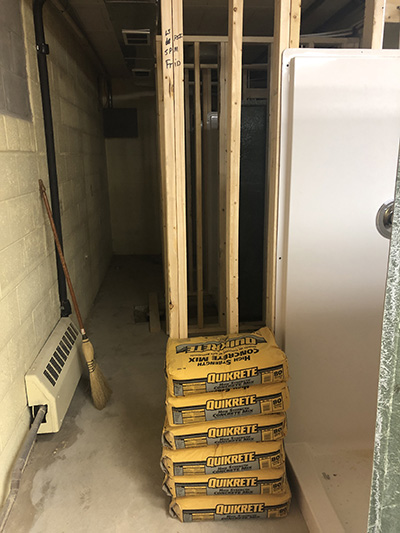
Here are the other three showers:
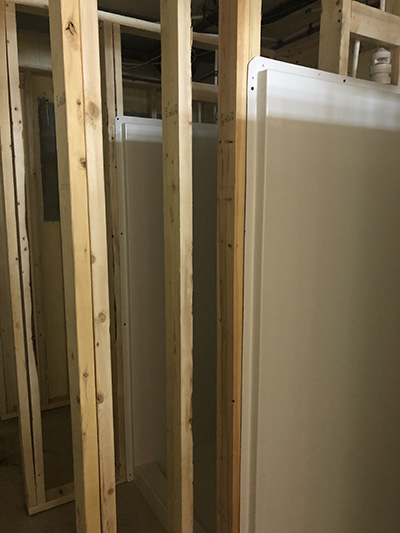
Here's what the plumbing for the showers looks like so far:
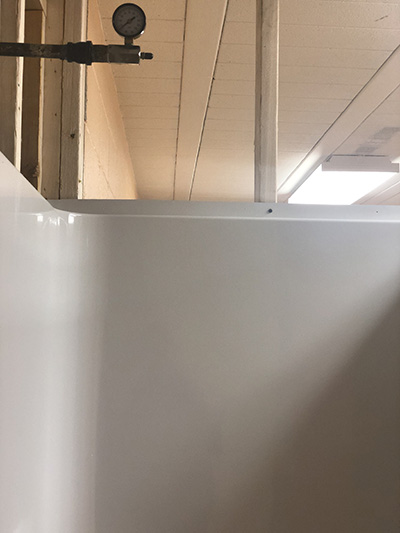
We're excited to see this project come to a close so LOG (and other organizations like it) can really feel at home here at Kern Road Mennonite Church. We'll be sure to post pictures when the work is completely done.
Add a comment
